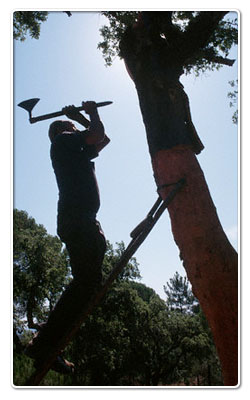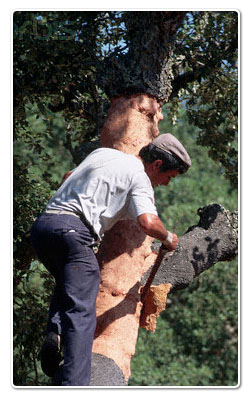|
Cork Oak Trees |
Cork was at one time a common flooring product and because of its many benefits it is enjoying a resurgence in popularity. While cork may be something you haven't used other than to plug a wine bottle or set a drink on, as flooring it has some impressive qualities to recommend it!
With more and more people "going green" or becoming environmentally minded, cork flooring is being seen as an excellent choice because rather than cutting down the whole tree, just the bark is used to make cork. It is simply peeled off the tree every nine years, and will then grow back without any harm to the tree in the process.
Surprising to many people is the spectrum of patterns and textures that cork flooring manufacturers have achieved. Colors also vary to an extent because during manufacturing cork is actually baked in ovens. The longer the cork is baked, the darker the color outcome. |

|
Cork in the Home |
|
 |
Cork flooring provides a wonderfully peaceful environment in home or workplace because it acts as a natural shock and sound absorber. It is durable and outlasts many other types of flooring. Natural air pockets make cork great for insulating, trapping heat and staying warm even when installed directly over concrete.
Maintenance of your cork floor entails basic sweeping or vacuuming, and spills can easily be wiped up with a sponge or paper towel. |
Since the 1600's, when Benedictine monk Dom Perignon first thought to seal a bottle of sparkling wine with cork instead of oiled rags, it has been the wine bottle stopper of choice. Bowing to pressure by supermarkets to protect against possible tainting, oxidation and leakage, vintners throughout California, Europe, South America, South Africa are replacing their natural cork with synthetics and in doing so, endangering one of the last natural forest ecosystems in Western Europe, and along with it an economy and culture that has grown up around cork farming over thousands of years. In an effort to conserve the cork-producing regions of Spain and Portugal, the SmartWood program of the Rainforest Alliance has awarded its first certification for sustainable management. Nine hundred and twelve hectares (2,254 acres) of cork land managed by Fruticor -- a group of small land owners and managers in the Alentejo cork region of Portugal -- have been certified by SmartWood for meeting the terms of the Forest Stewardship Council (FSC) for responsible management.
The recent increase in demand for synthetic cork by top wineries in the United States, including Beringer Wine Estates, Clos Du Bois, Kendall-Jackson, Robert Mondavi, Sebastiani Vineyards and others, has prompted concern that by threatening the traditional cork industry, the new stoppers could undermine the economic basis of cork farming and thereby the cork-producing areas of the Iberian peninsula where cork oak forests (montados) represent around 21% of the forest area and are responsible for the production of more than 50% of the cork consumed worldwide. While in the US, 10% of wine bottles are sealed with synthetic corks, that number is expected to grow. Last year, Neocork Technologies, manufacturer of synthetic cork, relocated its world headquarters to Napa, California, where it will deliver an estimated 500 million corks per year.
"The economy, culture and environmental sustainability of some of the last natural areas of the Iberian peninsula rests on increased demand for sustainably produced cork," explains Jamie Lawrence, SmartWood's regional manager for Western Europe. "The certification of Fruticor's management is a major step towards conserving some of the last natural landscapes of Western Europe along with key species of plants and animals."
"This is a major step for biodiversity conservation and for the cork trade. Cork oak forests rank among the first biodiversity hotspots in the Mediterranean and in Europe. At the same time they are the backbone of an entire economy. FSC certification will reinforce the already environmental-friendly characteristics of the cork economy, leading to new opportunities in cork markets," notes Nora Berrahmouni, coordinator of the World Wildlife Fund's Cork Oak Landscapes Programme.
Cork-growing lands tend to be models of sustainable management. The cork oak tree (Quercus suber) is unique in that its thick bark can be stripped off every decade to extract the cork without damaging the trees, which live 170 to 250 years on average. Carried out by skilled craftsmen, the stripping process has remained virtually unchanged for nearly 3,000 years. Not only does the stripping yield the cork, but it maintains the forest ecosystem, the structure and composition of which depends on human interaction with the natural environment. Unless the cork is stripped regularly, the bark ages too much and extracting it would cause damage to the tree.
 |
The montados, where the cork oaks thrive, are largely open swaths made up of grassland and scrub vegetation interspersed by trees, where farmers have practiced a low-intensity mix of agriculture and forestry for millennia. Careful forest management not only provides for the continued extraction of the cork oak but helps to create the conditions for a diverse range of other products harvested from the woodlands. Villagers gather edible fungi for their own consumption, use rockrose bushes for firewood in their traditional stone bread ovens and tap local beehives for honey flavored with native lavender and rosemary. On even a small patch of cork land a farmer can raise a herd of goats, a few cows and some pigs, which forage for acorns and graze beneath the trees. Income from cork can represent anywhere from 30 to 100 percent of a farmer's income.
"Without the demand for cork, economic pressures could force farmers to abandon the active management of cork forests, which may lead to rural exodus as well as unbalance the ecosystems that preserve the biodiversity of these Mediterranean hotspots," says Lawrence. |
"While some supermarkets and others have claimed that the use of plastic in lieu of cork will contribute to the forests' environmental protection, this is absolutely untrue," states Richard Donovan, Rainforest Alliance's chief of forestry. "The certification of Fruticor and forests like it is key because it means that Amorim, one of the world's largest cork products manufacturers, which owns two manufacturing certified by the SmartWood in 2004, will now have a supply of certified cork."
"The SmartWood/FSC certification for both cork forests and industrial cork companies clearly meets the growing market demand for sustainable natural products, especially from major international distribution chains," explains Carlos de Jesus, marketing and communications director for Amorim & Irmaos S.A. "But, as importantly, it also validates the unique ability of cork to contribute to the advance of crucial environmental, economic, cultural and social aspects relevant to the entire Western Mediterranean Basin. As such, we hope the FSC status recently granted to Portuguese industrial and forestry companies inspires organizations in other countries to realize that it is distinctly possible to create wealth while protecting the environment."
|